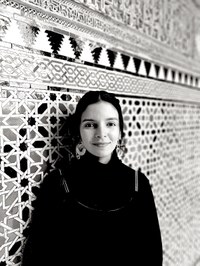Natalia Gómez Muñoz
- Kontakt
- Akademischer Werdegang
- Akademischer Werdegang
-
- Since 2020 – Ph.D. in Cultural and Environmental Heritage, focus on Social Anthropology at the Alma Mater Studiorum - Università di Bologna in cotutelle with the Ph.D. in Social Sciences at the Justus-Liebig-Universität Gießen
- 2018 – M.A. The Americas/Las Americas, Friedrich-Alexander Universität Erlangen-Nürnberg
- 2015 – B.A. Anthropology, Universidad Nacional de Colombia Colombia
- Akademisch-berufliche Tätigkeiten
- Akademisch-berufliche Tätigkeiten
-
Beruflicher Werdegang
- 02/20 – 11/20 Field Interviewer- International Macro-Territory. Comisión de la Verdad de Colombia (The Commission for the Clarification of the Truth of Colombia) - Berlin, Germany
- 7/19 – 12/19 Project’s Expert. NGO Misión Scalabriniana. Project "Comisión de la Verdad de Colombia en Ecuador” (Commission for the Clarification of the Truth of Colombia in Ecuador)"- Quito, Ecuador
- 1/19 – 6/19 Research Associate. Faculty of Philosophy, Theology and Social Sciences - University Friedrich-Alexander Erlangen-Nürnberg - Erlangen, Germany. Project "Migration, Identity and Language: "Bateyes" in the Dominican Republic".
- 12/17 – 11/18 Graduate Research Assistant. Institute of Geography. Chair of Cultural Geography. University Friedrich- Alexander Erlangen - Nürnberg - Erlangen, Germany. Project on the prospects of migration, work and education of youth in the border region between Ecuador and Perú.
- 4/17 – 10/17 Graduate Research Assistant. Institute of Romance Languages. Chair of Romance Languages (Spanish). University Friedrich- Alexander-Erlangen-Nürnberg - Erlangen, Germany. Project "Migration, Identity and Language: "Bateyes" in the Dominican Republic".
Eherenamtliche Tätigkeiten
- 06/2020 (Current). Member. Aluna Minga e.V. – Munich, Germany
- 06/2019 (Current). Contributor. Radio program “Sin fronteras”, Radio Z – Nürnberg, Germany
- 06/2018 (Current). Co-Founder. Red Interdiciplinaria de Investigación sobre las Américas (RIIA). Nürnberg, Germany
- Forschungsschwerpunkte
- Forschungsschwerpunkte
-
- Anthropology of Migration
- Peacebuiling and Conflict research
- Regional focus on Latin America and the Caribbean
- Publikationen
- Publikationen
-
- Gómez Muñoz, N. (2021). Ideologías lingüísticas, racismo y anti-haitianismo en las escuelas de los bateyes del sureste dominicano: criollo haitiano, español e inglés en perspectiva crítica. Cuadernos del Caribe, (26), 19-30. Recuperado a partir de https://revistas.unal.edu.co/index.php/ccaribe/article/view/98392
- Gómez, N. (2019) The U.S. Military and Sexual Abuse: Representation in the Colombian Newspaper El Tiempo." americana. Highlights from the Americas: 1–10. Available at https://thestacks.libaac.de/handle/11858/379
- Gómez, N. (2018) The Curriculum Materials in the Dominican Batey: Education in the Context of Haitian Diaspora. Conference Proceedings. Paper presented at the Congress of the Latin American Studies Association in Barcelona, Spain, May 23 - 26, 2018.
- Thesis Abstract
- Thesis Abstract
-
Entitlement, Deservingness and Notions of Need: Colombian Forced Migrants and their Livelihoods amid Social Impact Investing
Building on a growing body of anthropological work on development interventions and on contemporary discussions about the moral turn in capitalism, this study uses an ethnographic approach to explore the Colombian context of social impact investing and its entanglements with the lives and livelihoods of forced migrants. Social impact investing is an aggregation of actors and initiatives that have been responding to social challenges using market forces, in the capital and financial markets, allegedly with double-purpose goals: to generate ‘good’ -vaguely defined-, and, at the same time, financial returns. Top level governance and different political and programmatic stakeholders in Colombia have embraced social impact investing as a way to increase the resources available for the improvement of the living conditions of the population (Bain & Company, Inc., 2014); to fill the funding gaps that exist on the road to overcoming so many years of war (Global Steering Group for Impact Investing, 2019); and to make development interventions more outcome oriented, rather than based on the delivery of specific activities (Reisman et. al., 2018).
Specifically, I seek to understand how notions of entitlements, needs and deservingness around certain problems, places and people are produced throughout the Colombian Program for Impact Investing “SIBs.Co” and (i.e., who needs/deserves/is entitled to: job placement support; financial returns; peacebuilding interventions). I first examine the rationale and aims of the Program SIBs.Co as formulated by the commissioners: the Swiss State Secretariat for Economic Affairs (SECO), the Inter-American Development Bank and the Colombian government. Then, I approach the Empleando Futuro Bond through the service providers, to understand how they re-interpret, reproduce and/or contest the perspectives of the Program and the Bond, in the moral, economic, and administrative dimensions, when putting it into practice. Finally, I work with the intended “beneficiaries”, inquiring about this term, both in terms of identity and power relations, and accounting for how they respond and cope with the Program and Bond’s configurations, and intended outcomes while searching for new livelihoods.

